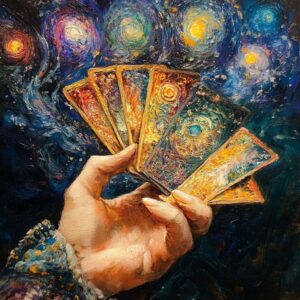
Daedalus was an exceptionally skilled craftsman, renowned for his work with knights and princes. Even in the early stages of his career, he received praise for his inventions and creations from the goddess Athena. Due to his talents, his sister entrusted her 12-year-old son, Talos, to Daedalus so that he could learn from his wisdom. Talos grew up to become a talented and respected craftsman, sparking jealousy and fear in Daedalus for his own status. When Talos showed Daedalus his latest invention—the saw, inspired by observing a fish's spine—Daedalus was overcome with jealousy and fear for his position. In a moment of madness, he threw his nephew and student from the tower of Minerva, the goddess of wisdom and science, where the two were studying. Minerva saved Talos by turning him into a goldfinch.
After killing Talos, Daedalus fled to the island of Crete, where he confessed everything to King Minos and sought refuge. Recognizing Daedalus's talent, the king granted him asylum and restored his honor as the kingdom's craftsman. Minos asked him to build the Labyrinth, a maze designed to hide and imprison the Minotaur, the son of Minos's wife. Once the construction was completed, King Minos decided to imprison Daedalus and his son Icarus in the Labyrinth as well, to prevent anyone else from learning the secrets of its construction. According to another version, they were imprisoned because Daedalus had helped Theseus kill the Minotaur. Minos discovered their escape from the Labyrinth and imprisoned them in a tower.
To escape from the tower and the island, since the sea was guarded by Minos's ships and soldiers, Daedalus decided to flee through the air. He collected bird feathers, fastened them with wax, and built two pairs of wings. After attaching the wings with harnesses, Daedalus and Icarus donned them and managed to fly away from Crete.
Before they fled the island, Daedalus warned his son not to fly too high, lest the sun melt the wax. However, Icarus, thrilled by his ability to fly, soared too high. The sun melted the wax that held the wings to his body, and he fell to his death. Daedalus found his son's body, which had washed ashore, and in his grief, cursed his talents that had led to his child's death. He buried Icarus on an island named after him, Icaria. Icarus's death was seen as divine retribution for Daedalus's earlier crime against his nephew Talos.
Daedalus eventually reached Sicily, where he began to rebuild his reputation. He worked at the court of King Cocalus, and later in life, Daedalus continued to design and construct unique buildings, successfully rebuilding his professional and personal life, as well as the respect he once commanded.
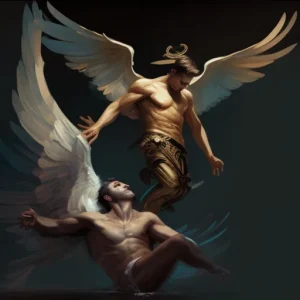
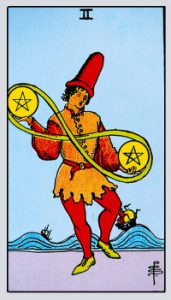
Two of Pentacles: At the beginning of his career, Daedalus received praise for his early works from the goddess Athena, establishing his reputation as a skilled craftsman and inventor. Despite this recognition, Daedalus felt that he wasn't as talented as others believed. This card represents internal conflict and self-doubt, driven by a focus on what might be wrong or insufficient, rather than acknowledging what is right and what has been achieved. The person knows what is correct and how to proceed, yet finds themselves tangled in uncertainty.
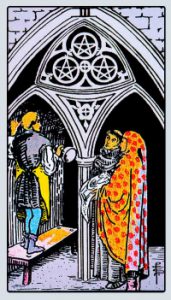
Three of Pentacles: Daedalus works at the king's court, earning a salary that brings him financial security, reputation, and respect. This Tarot card represents recognition of skills and the financial reward that comes with them. It encourages putting in effort and continuously improving one's abilities, highlighting the value of hard work and the acknowledgment it brings.
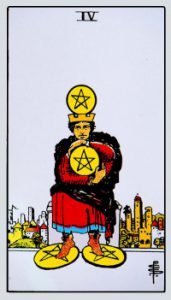
Four of Pentacles: Daedalus feels threatened by his nephew Talos, a talented craftsman in his own right, which causes Daedalus to fear for his status. This card represents the fear of losing what has been achieved—status, livelihood, and security. This fear can prevent a person from enjoying their accomplishments and lead to feelings of helplessness, melancholy, and rigidity. Such behavior might ultimately result in losing the very things one is trying to protect. This sense of insecurity is often not rooted in reality, but it can still have a powerful impact.
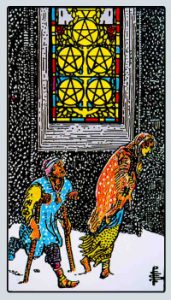
Five of Pentacles: Overcome by jealousy, Daedalus loses control and throws Talos from the roof to his death. In one moment of madness, Daedalus loses his status, honor, wealth, and even his family, leading him to flee with his son to Crete. This card represents destruction and failure resulting from the querent's actions. It is one of the most challenging cards in the deck, symbolizing the destructive aspects of a person's personality. It serves as a reminder of how unchecked emotions and actions can lead to significant loss and hardship.
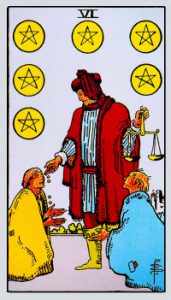
Six of Pentacles: Daedalus arrives on the island of Crete, confesses his actions to King Minos, and begs for mercy and refuge. Recognizing Daedalus's talent, Minos grants him asylum, restores his professional status, and hires him as a craftsman in the royal court. This card represents situations in life where one receives more than what they might deserve, even before proving themselves. It signifies opportunities and positions that come with responsibility, urging the querent to act with gratitude and to live up to the faith others have placed in them. Now, it is up to the querent to prove themselves worthy of the trust and generosity they've received.
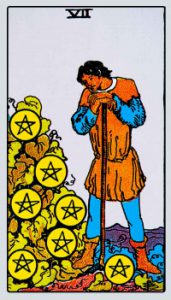
Seven of Pentacles: Daedalus, who is building the Labyrinth, finds himself trapped on the island of Crete—both because King Minos won't allow him to leave and because of his own past crimes. This card represents disappointment. Although the querent's financial situation, professional status, and recognition have improved, there is a lingering sense that they must pay for past actions. The querent is at a crossroads, needing to decide whether to take a risk and create change, even if it means facing the consequences of their past, or to remain in a place that no longer suits them.
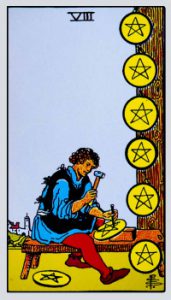
Eight of Pentacles: After escaping and losing his only son during the flight, Daedalus arrives in Sicily, where he works for King Cocalus. Once again, he must prove himself and his talents, starting over as an apprentice. This card represents apprenticeship, symbolizing hard work and the dedication required when immediate results are not forthcoming. It speaks to the importance of perseverance, patience, and continuous learning in the pursuit of mastery.
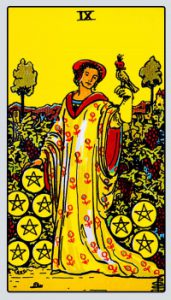
Nine of Pentacles: Daedalus proves himself as a skilled craftsman and becomes a beloved and respected figure. He solidifies his professional status, achieving recognition for his hard work and talent. This card represents the rewards that come to the querent as a result of their dedication and effort. It signifies the achievement of success, where one’s work has borne fruit. The time has come to enjoy the benefits of what has been earned and to turn accomplishments into a lasting legacy. This card reflects a stage of fulfillment, where the querent can finally enjoy the fruits of their labor, much like a doctor who, after completing medical school and residency, now enjoys a successful and respected career.
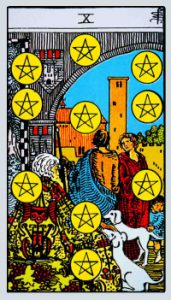
Ten of Pentacles: Daedalus restores his success, gains respect, happiness, and wealth, and is blessed with children and grandchildren. This card represents the stage where the querent recognizes their strength and abilities, free from the fear of loss. It symbolizes the desire to establish a solid foundation, to feel secure, stable, and abundant. The card reflects a deep sense of fulfillment and the satisfaction that comes from building a lasting legacy for future generations.

Orit Raphael, Tarot Reader for Personal Guidance, Insights, and Messages